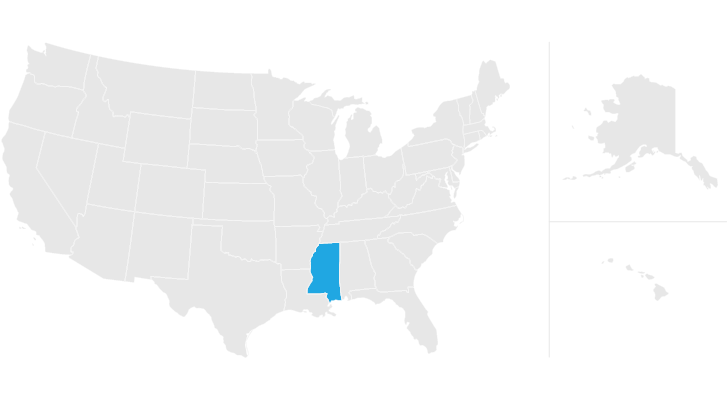Mississippi has no estate tax, but the federal estate tax will still apply to Mississippians if their estate is worth enough. This page guides Magnolia State residents through what they need to know to protect their assets and make sure their families are ready for any estate tax issues that may come up after they’ve died. Planning an estate takes some time and patience, so working with a professional may be helpful.
Do you have questions? SmartAsset’s free tool can match you with financial advisors who serve your area.
Mississippi Estate Tax
Mississippi is one of 38 states that does not levy an estate tax.
What Is the Estate Tax?
The estate tax, sometimes referred to as the “death tax,” applies to the estate of a person who has recently died. The money or assets in the estate are taxed before they are passed on to a person’s designated heirs, and the tax applies only to estates valued above a certain threshold.
The inheritance tax is different from the estate tax. The inheritance tax is applied to money or assets already passed on to a person’s heirs. Beneficiaries are responsible for paying the inheritance tax on the assets they inherit.
Mississippi Inheritance and Gift Tax

Mississippi has no inheritance tax. However, it’s possible that another state’s inheritance tax could apply to you if someone who lives in a state with an inheritance tax leaves you something in their will or estate plan. In Pennsylvania, for instance, any property or assets that a resident of the state passes on is subject to the inheritance tax, even if the inheritor lives out of state. If someone living out of state leaves you money or assets, check local laws to see if you owe any taxes.
Mississippi does not have a gift tax. The federal gift tax exemption is $19,000 for each gift recipient in 2026. So if you gift more than $19,000 to a single person this year, the law requires you to report that gift to the IRS. The excess of $19,000 counts against your lifetime gift tax exemption of $15 million and lowers your federal estate tax exemption.
Federal Estate Tax
Though Mississippi does not have an estate tax, the federal government will levy an estate tax if your estate is worth enough. The federal estate tax exemption is $15 million for 2026, up from $13.99 million in 2025. The exemption is portable for married couples. This means that spouses can protect up to $30 million when they both die, as of 2026.
Any estate worth more than the exemption is subject to a progressive estate tax, with a top rate of 40%. A full table of rates is provided below.
Here is an example: Let’s say your estate is worth $20 million. Subtract the $15 million exemption and you’re left with a taxable estate of $5 million, placing you in the top tax bracket. You’ll owe a base payment of $345,800 on the first $1 million and 40% on the remaining $4 million, which comes to $1.60 million. Add in the base payment and you’re left with a total tax burden of $1,945,800.
Federal Estate Tax Rates
| Taxable Estate* | Base Taxes Paid | Marginal Rate | Rate Threshold** |
| $1 – $10,000 | $0 | 18% | $1 |
| $10,000 – $20,000 | $1,800 | 20% | $10,000 |
| $20,000 – $40,000 | $3,800 | 22% | $20,000 |
| $40,000 – $60,000 | $8,200 | 24% | $40,000 |
| $60,000 – $80,000 | $13,000 | 26% | $60,000 |
| $80,000 – $100,000 | $18,200 | 28% | $80,000 |
| $100,000 – $150,000 | $23,800 | 30% | $100,000 |
| $150,000 – $250,000 | $38,800 | 32% | $150,000 |
| $250,000 – $500,000 | $70,800 | 34% | $250,000 |
| $500,000 – $750,000 | $155,800 | 37% | $500,000 |
| $750,000 – $1 million | $248,300 | 39% | $750,000 |
| Over $1 million | $345,800 | 40% | $1 million |
*The taxable estate is the total above the 2026 federal exemption of $15 million.
**The rate threshold is the point at which the marginal estate tax rate kicks in.
Overall Mississippi Tax Picture

Mississippi is very tax-friendly for retirees. The state does not tax Social Security benefits, income from public or private pensions or withdrawals from retirement accounts, including IRA and 401(k) plans. If you are still working in some capacity in your retirement, the state income tax is fairly low. Rates range from 0% to 4.4%.
Property taxes are also low. The average effective rate is 0.65%.
Estate Planning Tips
- Planning an estate requires a lot of attention to detail. If you want professional help, a financial advisor can be helpful. Finding a financial advisor doesn’t have to be hard. SmartAsset’s free tool matches you with vetted financial advisors who serve your area, and you can have a free introductory call with your advisor matches to decide which one you feel is right for you. If you’re ready to find an advisor who can help you achieve your financial goals, get started now.
- Don’t forget to update your will. Life changes all the time. If you haven’t updated your will in decades, it might not accurately reflect your wishes by the time you die.
Photo credit: ©iStock.com/vistoff, SmartAsset, ©iStock.com/izusek
